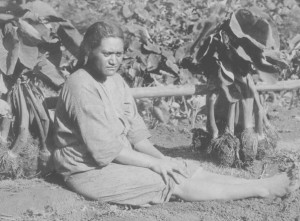Where indeed.
Via.
Agricultural Biodiversity Weblog
Agrobiodiversity is crops, livestock, foodways, microbes, pollinators, wild relatives …
Where indeed.
Via.
John Cho — he of the leaf blight-tolerant hybrids — has just posted some wonderful archive photographs of old Hawaiian taro culture to his Facebook page. He kindly agreed to us featuring one of them.

Here’s the backstory.
The images are from photographs archived in the State Archives that I selected and had them scanned by a third party. Sure would have been nice and less costly if the Archives digitized all the images that they have and allow the public to download them. But that is not the case and I had to hire a professional photographer contracted by the Archives to photograph then scan black and white negative images of taro photos that I had selected from the collection. I had planned to eventually put together a taro publication summarizing taro production and culture in Old Hawaii but have not quite gotten off the ground as yet. I decided to at least share some of the images on Facebook for the public to see and hopefully some day I would get off my duff and put the publication together. I also have several scans of taro culture from the Bishop Museum but require their permission to post their images on Facebook.
The case for the prosecution: Kenyans are losing their food culture. The case for the defence: traditional foods are being revived and this is attracting the attentions of multinational. I suspect the truth, as ever, is somewhere in between. How so very boring.